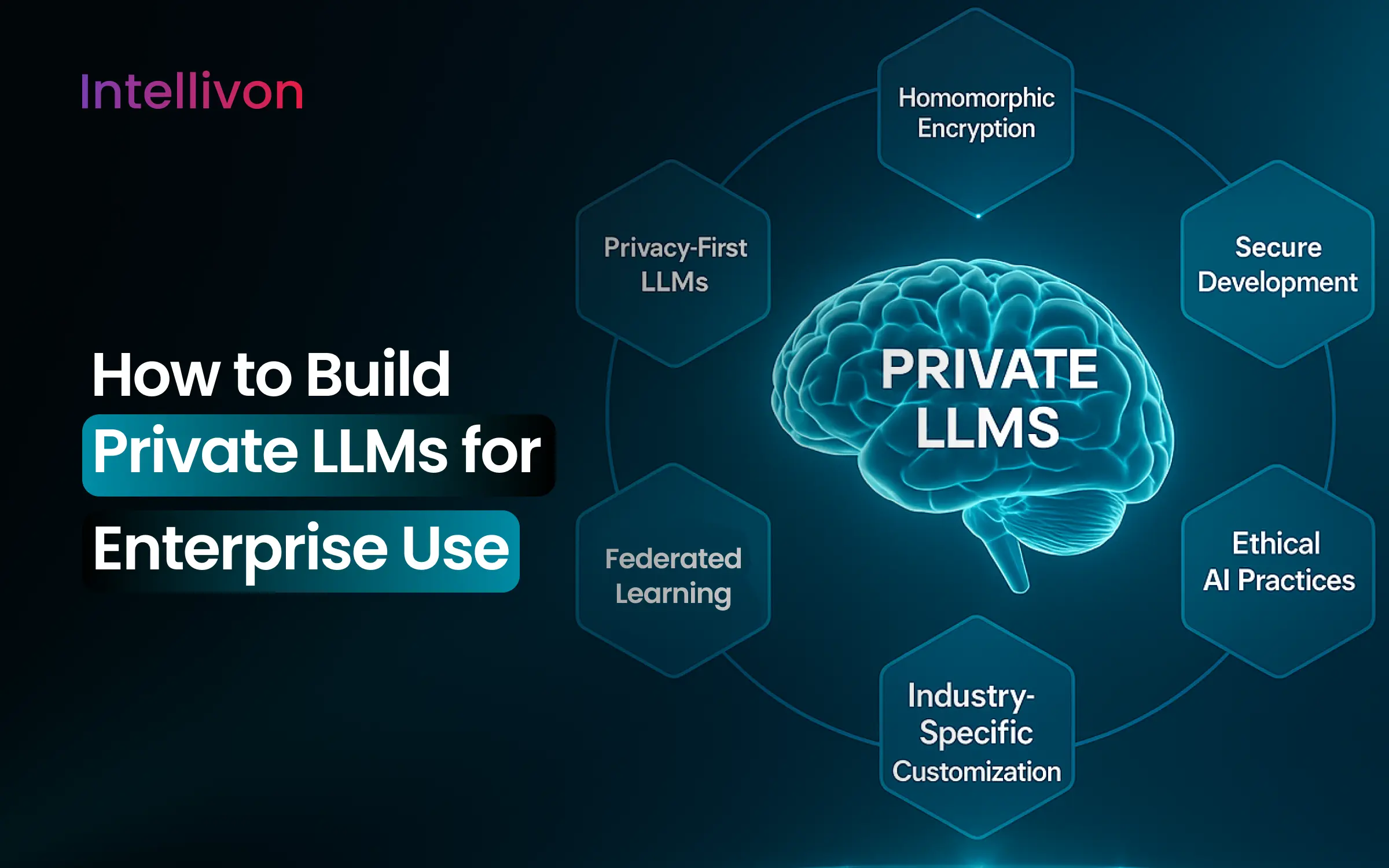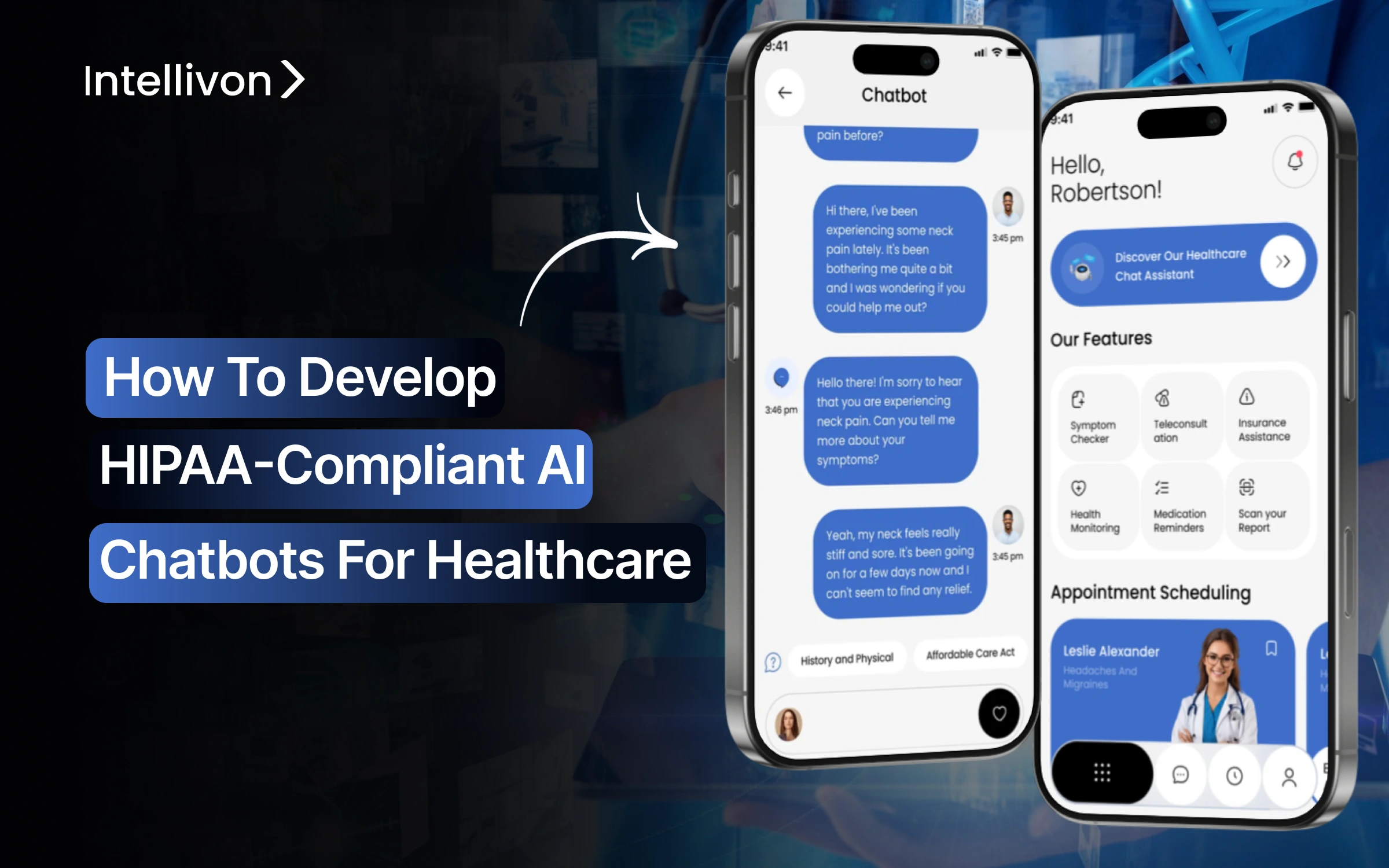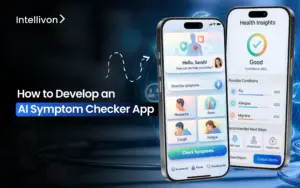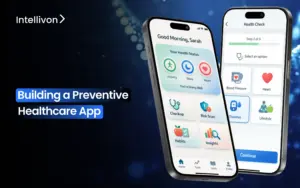Healthcare data is among the most sensitive information in the world, and it’s expensive when it leaks. According to the 2024 IBM Security Cost of a Data Breach Report, the average cost of a healthcare data breach has surged to $4.88 million, the highest across all industries for the 13th year in a row. This anomaly represents shattered trust, delayed treatments, lawsuits, and years of recovery for patients and providers alike.
These data breach incidents are not rare. As hospitals and clinics turn to AI-powered tools to streamline operations and enhance patient experience, the risks keep piling up. This is why HIPAA compliance for AI chatbots is a mission-critical safeguard. A HIPAA AI chatbot must protect every click, response, and byte of information that must be treated as protected health information (PHI), even in real-time interactions.
In this guide, we’ll walk you through why and how healthcare enterprises can build HIPAA-compliant AI chatbots the right way. From understanding patient data risks to implementing secure architecture, you’ll get a clear, actionable roadmap. Intellivon’s team has helped enterprises build and successfully deploy HIPAA-compliant AI chatbots since 2014. We offer integration of advanced pre-trained AI models as well as the development of bespoke AI solutions tailored to your enterprise. Our process ensures that the end software meets all HIPAA regulations and adheres to the highest standards of healthcare data security.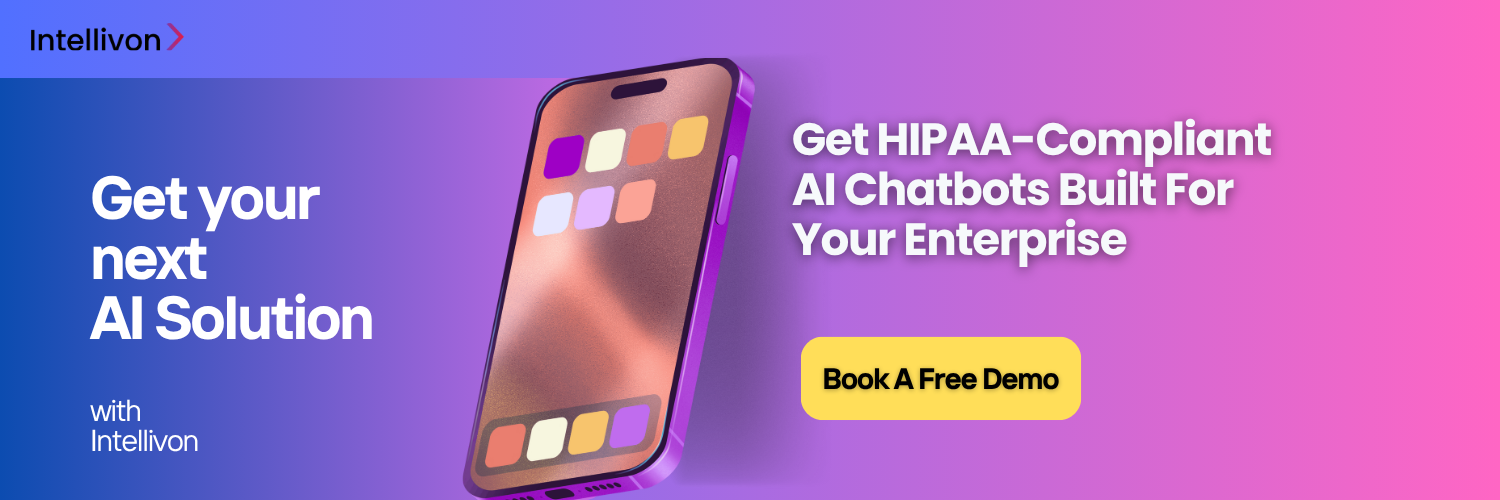
Why You Should Use HIPAA-Compliant Chatbots for Your Enterprise
The global healthcare chatbot market is projected to soar from $1.2 billion in 2024 to $4.36 billion in 2030, reflecting an impressive 24% compound annual growth rate (CAGR) from 2025 to 2030. This means almost all leading healthcare enterprises will integrate chatbots into their workflow automations and patient care operations. This means more and more private data will be susceptible to data breaches. This is where enterprises that integrate HIPAA-compliant chatbots will be able to protect their data while staying ahead of the growing competition.
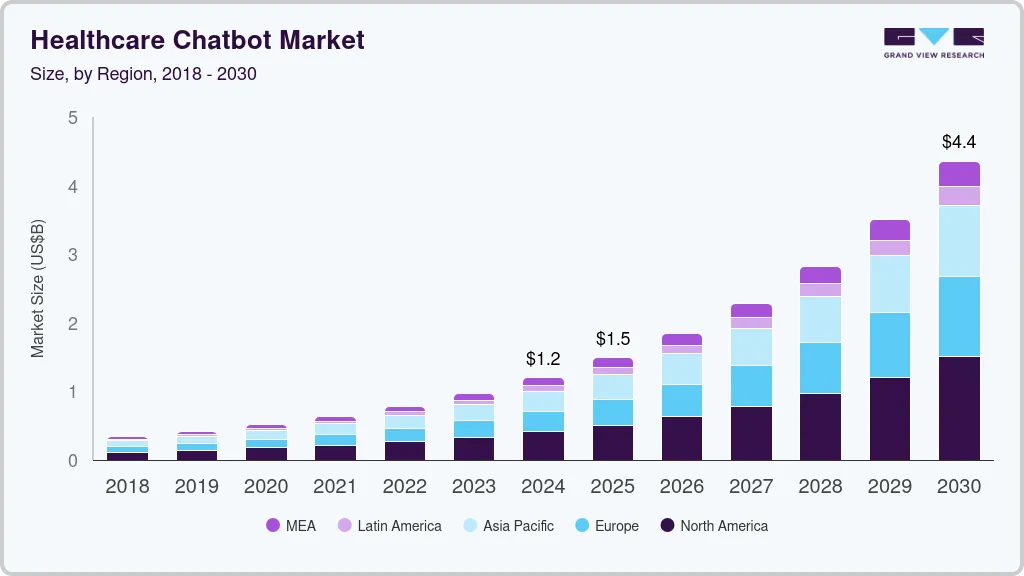
Why Enterprises Need HIPAA-Compliant Chatbots
As AI tools become more common in healthcare, protecting patient data is no longer optional. A HIPAA AI chatbot is a compliance and trust imperative.
1. Legal and Financial Protection
In the U.S., handling protected health information (PHI) without HIPAA compliance can lead to fines of up to $1.5 million per violation. Yet, only 29% of healthcare organizations say they are fully compliant. That’s a serious gap, and a serious risk. By using a HIPAA AI chatbot, healthcare providers can avoid these penalties and meet legal obligations with confidence.
2. Enhanced Data Security and Patient Trust
HIPAA-compliant chatbots use end-to-end encryption, secure logins, and tight access controls. This helps protect sensitive patient data from leaks and cyberattacks. Beyond tech, there’s trust. A single breach can destroy patient confidence. Starting with security-first chatbot design helps prevent that.
3. Operational Efficiency and Lower Costs
Chatbots can automate scheduling, reminders, and FAQs, reducing pressure on admin staff. During the COVID-19 peak, some health systems handled 20,000+ patient queries a day using chatbots. Top-performing bots even show 80–90% engagement rates, a clear sign that patients are willing to use them.
4. 24/7 Patient Access and Support
Unlike humans, chatbots don’t sleep. They offer round-the-clock support, helping patients get answers faster and reducing wait times. They’re also a big help for remote care, chronic condition management, and mental health check-ins, especially in areas with limited access to care.
5. Seamless Integration and Easy Scalability
Modern HIPAA AI chatbots work well with existing systems like Electronic Health Records (EHRs) and telehealth platforms. This allows real-time data access while still keeping PHI protected. As demand grows, these bots can scale, without needing to hire more staff or invest in new infrastructure.
6. Built to Adapt with Future Regulations
A chatbot built for HIPAA today is better prepared for tomorrow. Privacy laws evolve (think GDPR, CCPA, HITRUST), and so does AI technology. Compliance-ready bots help future-proof your tech stack while still pushing innovation forward.
What Is HIPAA and Why It Matters for Healthcare Enterprises
The Health Insurance Portability and Accountability Act (HIPAA) is a U.S. federal law that sets the standard for safeguarding Protected Health Information (PHI). For healthcare enterprises, including hospital networks, payers, telehealth platforms, and AI vendors, HIPAA compliance is not a choice. It’s a legal mandate that governs how patient data must be stored, accessed, and transmitted.
Why HIPAA Compliance Is Non-Negotiable
1. Legal Liability and Penalties
Failure to comply with HIPAA can result in steep financial penalties, reaching up to $1.5 million per violation. For enterprise-level providers and technology vendors handling high volumes of PHI, a single breach could trigger multiple violations, and massive cumulative fines.
2. Earning and Maintaining Patient Trust
Patients expect healthcare platforms to protect their sensitive health information. Any failure can irreparably damage the patient-provider relationship. HIPAA AI chatbots that demonstrate proactive compliance reinforce trust and position the enterprise as a responsible care provider.
3. Interoperability Across the Healthcare Ecosystem
Compliance isn’t just about avoiding penalties. HIPAA compliance enables secure data exchange with partners, insurers, and EHR systems. It’s essential for seamless integration and collaboration across providers, insurers, and digital health platforms.
Key HIPAA Rules Every Enterprise Must Follow
1. Privacy Rule
This rule defines how PHI can be shared or disclosed. Enterprises must ensure that patients give informed consent before any data is transmitted to third parties, including through chatbots.
2. Security Rule
This outlines the administrative, technical, and physical measures required to safeguard PHI. That includes encryption, access control, breach detection, and staff training on secure handling of patient data.
3. Enforcement Rule
This governs how HIPAA is enforced by the U.S. Department of Health and Human Services (HHS). It details investigation processes and the penalty structure for non-compliance.
Why HIPAA Compliance Is Critical for Enterprise Healthcare Chatbots
As AI adoption expands, HIPAA-compliant chatbots are becoming essential infrastructure for large-scale healthcare operations. These systems process thousands of patient interactions every day, meaning one misstep can expose an entire enterprise to legal, operational, and reputational harm.
1. Avoiding Legal and Financial Fallout
Enterprise healthcare chatbots that manage patient data must meet HIPAA’s technical and administrative requirements. This includes real-time data encryption, strict access policies, secure hosting, and compliance monitoring. Without these controls, organizations risk fines, lawsuits, and loss of business partnerships.
2. Safeguarding Sensitive Patient Information
Large-scale chatbot systems often process and store sensitive patient details like symptoms, medication routines, lab results, and demographic data. A HIPAA AI chatbot protects this data through end-to-end encryption, granular access permissions, and immutable audit trails, significantly reducing breach risks.
3. Strengthening Brand Reputation and Patient Loyalty
In today’s digital-first environment, patients are more aware of privacy than ever. Enterprises that invest in compliant, secure chatbot technology demonstrate leadership and responsibility, attracting more patients and strengthening long-term relationships.
Benefits of HIPAA-Compliant Chatbots for Enterprise Healthcare
Some benefits of HIPAA-compliant chatbots for enterprise healthcare include:
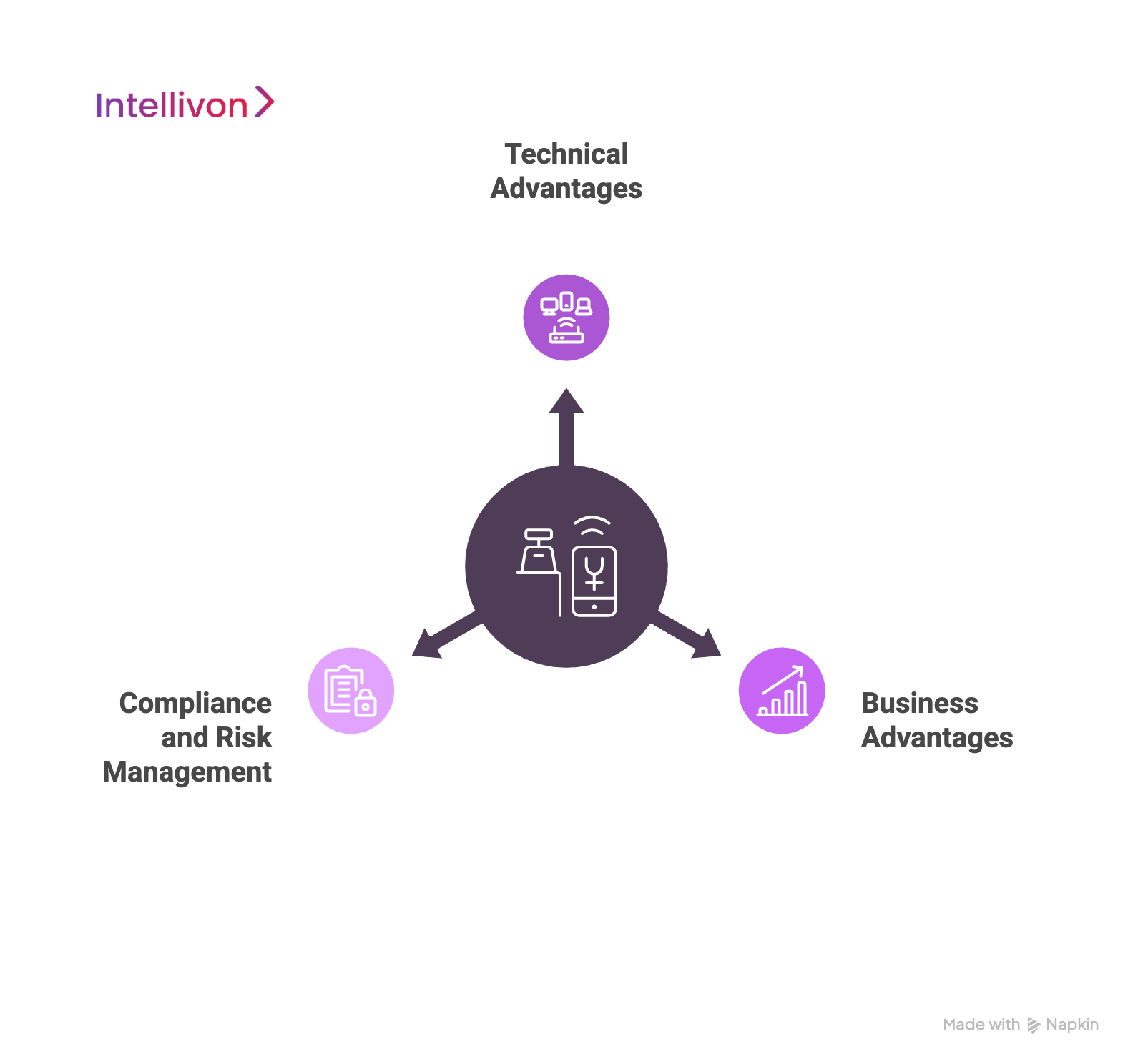
1. Technical Advantages
1. Enhanced Security Infrastructure
Compliant chatbots use multi-layered security, including multi-factor authentication (MFA), tokenization, and strict user access roles to ensure PHI stays secure at scale.
2. Integration with EHR and EMR Platforms
These systems are built to work with popular platforms like Epic, Cerner, Meditech, and others using FHIR APIs and SMART on FHIR protocols, ensuring real-time data exchange with full compliance.
3. Real-Time, Automated Patient Engagement
Enterprise chatbots can instantly handle thousands of inquiries, scheduling appointments, answering questions, and sending reminders without exposing PHI or overloading staff.
2. Business Advantages
1. Improved Patient Experience at Scale
A HIPAA-compliant chatbot offers 24/7 availability, eliminating long wait times and improving responsiveness, especially during peak periods or emergencies.
2. Lower Operational Costs
Automating high-volume workflows like appointment booking, symptom screening, and insurance checks reduces the load on human agents, cutting call center costs and improving service efficiency.
3. Enterprise Scalability and Future Readiness
Chatbots scale seamlessly to support growing patient populations, locations, and services. They also lay the groundwork for AI-driven innovations like predictive care, smart triage, and NLP-powered decision support.
3. Compliance and Risk Management
1. Reducing the Risk of PHI Breaches
HIPAA chatbots use encrypted session protocols, breach monitoring, and compliance logs to catch vulnerabilities early and secure data in real-time.
2. Meeting Multiple Regulatory Standards
In addition to HIPAA, enterprise chatbots often align with GDPR, HITRUST, and state-level mandates. Maintaining Business Associate Agreements (BAAs) with AI vendors ensures shared responsibility and risk transparency.
3. Avoiding Regulatory Penalties
With maximum HIPAA penalties reaching $50,000 per incident, non-compliance can become a financial liability. Enterprises with secure chatbot systems mitigate that risk, and gain leverage during audits and certifications.
In today’s high-stakes healthcare environment, investing in a HIPAA AI chatbot is essential. These tools build patient trust, meet legal obligations, and give enterprises the digital edge to thrive in a rapidly evolving healthcare landscape.
Different Types of Healthcare Chatbots and Their HIPAA Requirements
Healthcare chatbots vary widely in purpose and complexity. Each type handles different forms of patient information and must meet specific HIPAA requirements. Understanding these categories is essential before building or deploying a HIPAA AI chatbot.
1. Appointment Scheduling Chatbots
These chatbots allow patients to book, cancel, or reschedule appointments. In doing so, they typically collect names, phone numbers, dates of birth, and insurance details, all of which are considered protected health information (PHI) under HIPAA.
Mount Sinai Health System successfully deployed a scheduling chatbot integrated with their patient portal. It automates appointment management while ensuring data encryption and secure user authentication.
2. Symptom Checker Chatbots
Symptom checker bots guide patients through self-assessment workflows by collecting symptom details and offering triage recommendations. Since they deal with sensitive health data, HIPAA compliance is critical. These bots must ensure patient consent, audit logging, and restricted data sharing.
Mayo Clinic introduced an AI-powered symptom checker using natural language processing (NLP) to provide accurate guidance within a secure, HIPAA-compliant environment.
3. Medication Reminder Chatbots
Medication reminder chatbots notify patients when to take or refill prescriptions. These bots often access medication names, dosage schedules, and refill histories. While less complex than diagnostic tools, they must still protect PHI.
CVS Health’s chatbot integration within its mobile app exemplifies how enterprises can deliver adherence reminders while safeguarding prescription data via secure APIs.
4. Insurance Verification Chatbots
These chatbots validate insurance coverage, deductibles, and out-of-pocket costs before appointments or treatments. They connect with payer systems and often handle sensitive financial and identity information.
Oscar Health’s chatbot allows real-time eligibility checks from within its member app while maintaining strict data access controls to meet HIPAA obligations.
5. Telehealth Support Chatbots
Telehealth support bots play a vital role in pre-consultation processes. They collect patient intake forms, consent confirmations, and basic medical history ahead of virtual visits. Because these bots work directly with clinical workflows and EHR systems, HIPAA compliance must be airtight.
Teladoc Health expanded its telehealth chatbot capabilities to securely capture pre-visit data and connect patients with licensed clinicians, without exposing any PHI inappropriately.
Comparison Table: HIPAA Risks Across Chatbot Types
| Chatbot Type | Handles PHI? | HIPAA Risk Level | Example Use Case |
| Appointment Scheduler | Yes | Medium | Mount Sinai’s chatbot for automated booking |
| Symptom Checker | Yes | High | Mayo Clinic’s NLP-powered triage assistant |
| Medication Reminder | Yes | Low–Medium | CVS Health’s in-app refill and dosage alerts |
| Insurance Verification | Yes | Medium | Oscar Health’s coverage confirmation tool |
| Telehealth Support | Yes | High | Teladoc’s pre-visit chatbot integrated with EHRs |
Every chatbot category has unique HIPAA risks and technical challenges. Enterprises must match each bot’s purpose with the right compliance architecture. The stakes are high, but so are the rewards for getting it right.
How Healthcare Chatbots Process Patient Data While Staying HIPAA Compliant
Healthcare chatbots must process, transmit, and store sensitive health data in ways that comply with some of the most demanding data protection regulations in the world. For enterprises deploying large-scale AI systems, ensuring that every part of the chatbot interaction lifecycle aligns with HIPAA is essential.
Unlike traditional software tools, a HIPAA AI chatbot handles data in real time, often across multiple platforms and departments. That makes compliance a continuous, active process. Intellivon always puts data privacy and security first while developing cutting-edge AI solutions for enterprises. We understand the importance of proprietary healthcare data and build custom HIPAA-compliant AI solutions that guarantee enterprise scalability along with security checks. Here is how these chatbots work:
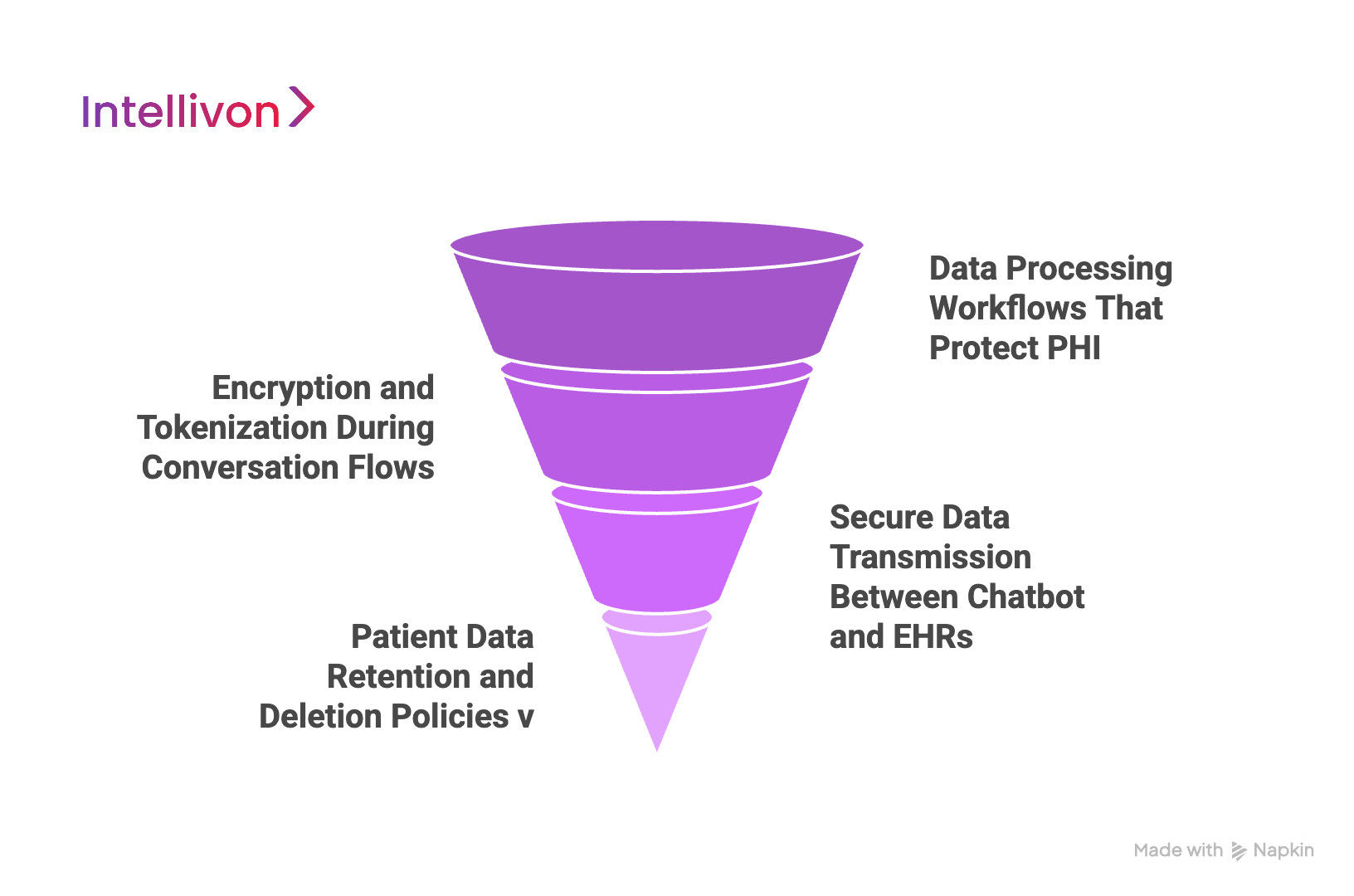
1. Data Processing Workflows That Protect PHI
Healthcare chatbots don’t wait to process information later. They operate in real time, dynamically handling Protected Health Information (PHI) from the moment a patient types or speaks. As a patient interacts with the chatbot, data is:
- Captured and encrypted instantly
- Routed securely through APIs like FHIR or HL7
- Integrated with EHR platforms for immediate record updates
This real-time flow demands session-level encryption, robust access controls, and continuous monitoring. For example, if a patient asks for a prescription refill, the chatbot must securely verify their identity, fetch the prescription from the EHR, confirm dosage details, and notify the pharmacy, all within seconds, without exposing PHI.
2. Encryption and Tokenization During Conversation Flows
To comply with HIPAA, encryption must be baked into every interaction, from start to finish.
- Data in transit is protected using Transport Layer Security (TLS) protocols, ensuring that information traveling between the user, the chatbot, and the healthcare backend is shielded from interception.
- Data at rest, including chat logs or extracted insights, is encrypted using standards like AES-256, safeguarding it in cloud servers or databases.
Many enterprise systems also deploy tokenization, a method that replaces identifiable patient information with non-sensitive placeholders. This approach limits internal exposure, meaning that even if a system is breached, the stolen data is meaningless without the token map stored elsewhere in a secure, segregated environment.
3. Secure Data Transmission Between Chatbot and EHRs
Seamless integration is a cornerstone of any enterprise healthcare chatbot. These bots connect to systems like:
- Electronic Health Records (EHRs)
- Billing platforms
- Pharmacy networks
- Appointment management systems
To maintain HIPAA compliance during this interoperability, each connection is governed by:
- Multi-factor authentication (MFA) to confirm identities on both ends
- Role-based access control (RBAC) ensures that only authorized systems and users can retrieve PHI
- Encrypted APIs like FHIR over HTTPS and HL7 to guarantee secure, standards-based data exchange
In addition, enterprises must sign Business Associate Agreements (BAAs) with any third-party providers handling chatbot infrastructure. This ensures that every partner in the data ecosystem is also contractually committed to HIPAA compliance.
4. Patient Data Retention and Deletion Policies
HIPAA isn’t just concerned with how you collect and use patient data; it also mandates how long you store it and how you dispose of it.
Enterprise-grade HIPAA AI chatbots enforce retention policies that align with federal, state, and organizational guidelines. This means:
- PHI is automatically deleted after its required retention period ends
- Anonymization tools scrub patient identifiers from datasets no longer needed
- Audit logs track when, how, and by whom data was deleted, creating a traceable record for compliance teams
These lifecycle controls help minimize unnecessary exposure to stale data, reducing long-term breach risks and audit vulnerabilities.
How It All Comes Together in a HIPAA-Compliant Chatbot
From intake to response, integration, and deletion, every touchpoint in a chatbot’s interaction with patient data must be secure, auditable, and compliant. Intellivon develops successful HIPAA-compliant chatbots that:
- Uses end-to-end encryption at every stage of interaction
- Enforces real-time access controls and monitoring
- Integrates via secure APIs with critical healthcare systems
- Manages data retention and disposal with precision and documentation
For large healthcare enterprises, these capabilities ensure that AI can scale securely without exposing the organization to compliance risk. Whether it’s assisting in telehealth, automating follow-ups, or accessing patient records, the chatbot serves as a real-time, trusted extension of the clinical team.
Real-World Use Cases of HIPAA-Compliant Chatbots in Healthcare
In 2025, healthcare enterprises are deploying HIPAA AI chatbots not only for basic automation but as core infrastructure across clinical and administrative operations. These chatbots enable real-time patient engagement, compliance-first workflows, and enterprise-scale efficiency, all while protecting sensitive health information.
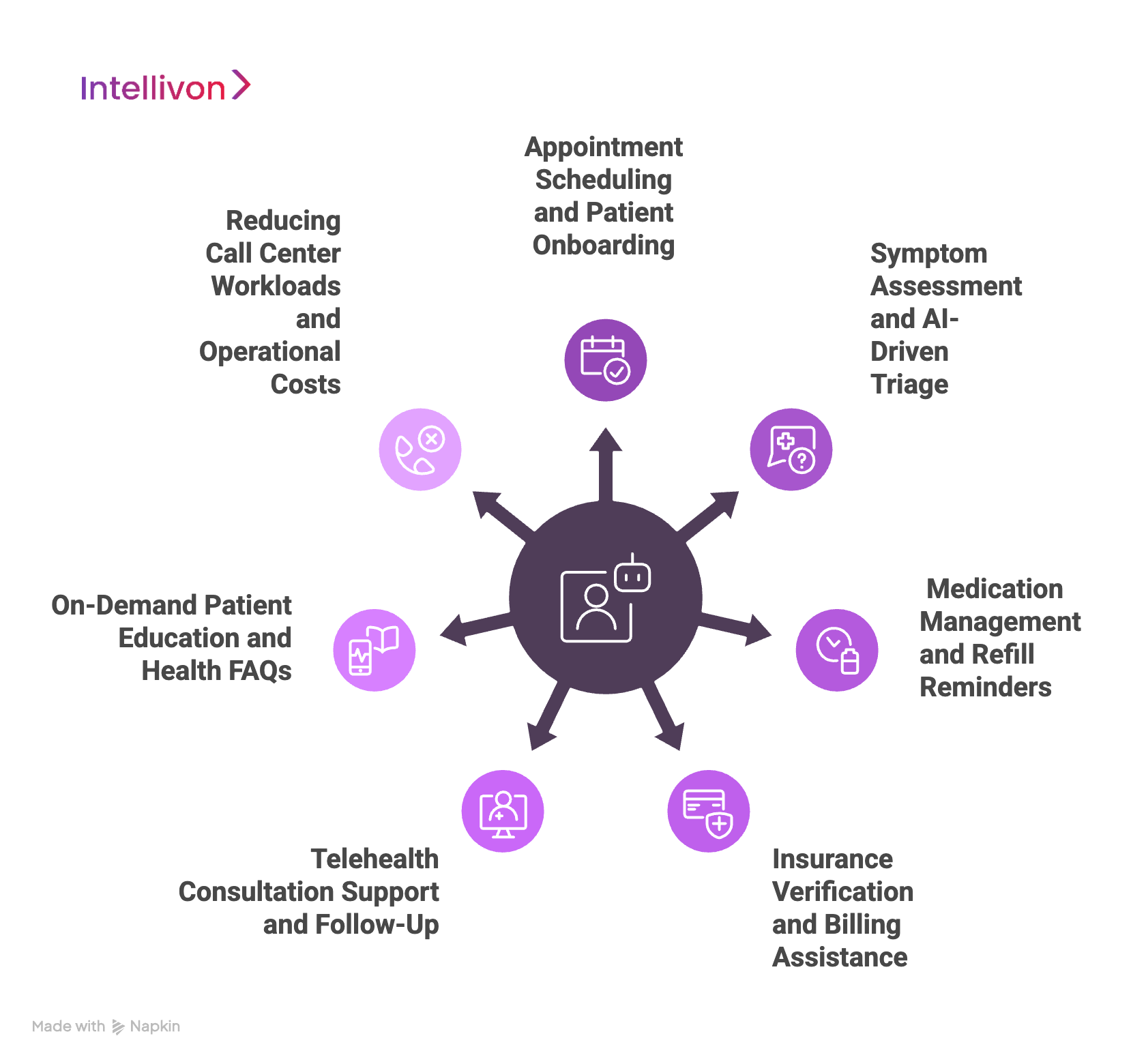
1. Appointment Scheduling and Patient Onboarding
Healthcare chatbots simplify scheduling by letting patients book, reschedule, or cancel appointments 24/7. They also assist with digital check-in, insurance verification, and pre-visit form completion, automating onboarding while reducing front-desk workload. With encrypted sessions and real-time consent capture, these bots stay fully HIPAA compliant.
Real-World Example: Cleveland Clinic
Cleveland Clinic uses an AI chatbot within its MyChart system to manage thousands of daily appointments. Patients can complete insurance forms, verify provider availability, and check in online, all protected with TLS encryption and role-based access to Epic’s EHR via FHIR.
2. Symptom Assessment and AI-Driven Triage
Conversational AI tools help patients self-report symptoms, assess severity, and determine whether care is needed. These HIPAA-compliant bots use encrypted data capture, dynamic privacy notices, and patient consent prompts to safely manage sensitive clinical data before routing it to providers.
Real-World Example: Mayo Clinic
Mayo Clinic’s Microsoft-powered chatbot conducts AI-based triage for users experiencing common symptoms. Integrated with Mayo’s virtual care services, the system encrypts all inputs and routes PHI securely into clinical workflows when escalation is necessary.
3. Medication Management and Refill Reminders
Chatbots help patients stay on track with medication schedules by sending automated refill reminders, dosage alerts, and side-effect FAQs. Integrated with EHR and pharmacy systems, these HIPAA AI chatbots use strong encryption and access controls to safeguard prescription data.
Real-World Example: CVS Health / Aetna
CVS Health deploys secure chatbots across its pharmacy and Aetna Health platforms. These bots send encrypted refill reminders, prescription pickup alerts, and adherence nudges, all while complying with HIPAA through tokenization and secure data exchange with internal systems.
4. Insurance Verification and Billing Assistance
Verifying coverage and explaining bills is time-consuming for patients. Chatbots now automate these tasks, checking eligibility in real-time and helping patients understand out-of-pocket costs. HIPAA-compliant bots safeguard insurance and financial details through secure APIs and authentication protocols.
Real-World Example: Kaiser Permanente
Kaiser Permanente’s chatbot verifies insurance benefits, tracks co-pays, and helps resolve claim disputes. Built into their member app, it uses audit-logged, HIPAA-compliant connections to backend billing systems and includes consent prompts for any PHI interaction.
5. Telehealth Consultation Support and Follow-Up
Chatbots collect pre-consultation details like medical history, symptoms, and medication lists to prepare clinicians ahead of time. Post-visit, they deliver care plans, manage follow-ups, and remind patients about tests, while keeping all exchanges encrypted and traceable.
Real-World Example: Teladoc Health
Teladoc’s chatbot automates pre-visit screenings and post-visit instructions for telemedicine appointments. All chatbot interactions are encrypted end-to-end, with real-time logging and secure consent management to meet HIPAA audit standards.
6. On-Demand Patient Education and Health FAQs
Chatbots answer common health questions and deliver personalized education about conditions, procedures, and wellness strategies. These systems limit PHI collection and trigger encryption when needed, keeping the patient informed while maintaining privacy.
Real-World Example: Mount Sinai Health System
Mount Sinai uses AI-powered chatbots to educate patients about surgery prep, recovery care, and chronic conditions. Content is pulled from verified clinical sources, and PHI is protected with auto-encryption and inline consent flows.
7. Reducing Call Center Workloads and Operational Costs
Healthcare enterprises are using HIPAA-compliant chatbots to manage common queries, like lab result timelines, clinic hours, or vaccine availability, reducing pressure on staff and minimizing hold times, all while protecting any shared patient data.
Real-World Example: Northwell Health
Northwell Health implemented chatbots across 20+ locations to handle FAQs and appointment management. Within a few months, their call volume dropped, resulting in an increase in annualized savings, without compromising HIPAA compliance at any touchpoint.
The enterprise use of HIPAA AI chatbots in 2025 proves that secure, conversational healthcare tools are essential. Every use case shows that intelligent automation and HIPAA compliance can go hand-in-hand when scaling digital healthcare in today’s regulatory landscape.
Advanced HIPAA Features Every Healthcare Chatbot Needs
Healthcare enterprises building HIPAA AI chatbots must go far beyond simple data encryption or privacy disclaimers. Today’s enterprise environments demand advanced, flexible, and deeply integrated features that support secure, compliant, and accountable patient conversations, all at scale.
At Intellivon, we specialize in delivering these mission-critical capabilities, helping leading health systems deploy AI chatbots that meet the highest HIPAA, HITECH, and interoperability standards.
1. Real-Time Consent Management
1. Dynamic Consent Capture at Every Interaction
HIPAA requires that patients explicitly authorize the use of their data. Enterprise-grade AI chatbots must display real-time consent prompts within the flow of conversation. Intellivon’s platform verifies and logs this consent before collecting any PHI, creating a seamless but compliant experience.
2. Granular Data Permissions
Patients may want to share general health info but not mental health or fertility details. Intellivon enables granular, category-level consent, letting users approve specific data types while keeping others restricted. This creates trust and allows enterprises to meet both HIPAA and emerging state-level mandates like CCPA and CDPA.
3. Automated Consent Renewal Workflows
Consent doesn’t last forever. Intellivon’s chatbots include automated consent expiration alerts and renewal triggers, ensuring continuous compliance and eliminating legal risk from outdated authorizations.
2. Clinical Decision Support Without Compliance Trade-Offs
1. Secure Integration with Clinical Databases
Decision-support AI is only as good as its data. Intellivon connects HIPAA AI chatbots with EHRs and clinical knowledge bases using FHIR-compliant APIs and OAuth2 protocols, ensuring that PHI stays encrypted and visible only to approved care teams.
2. Risk Stratification Without Revealing PHI
Our platform uses de-identified or tokenized data for risk scoring and triage recommendations. This protects individual privacy while still powering AI-led decisions that improve care outcomes.
3. Complete Logging of Clinical Suggestions
Every recommendation made by an Intellivon chatbot is stored in an immutable audit trail, including timestamp, user ID, and data source. These logs help healthcare organizations maintain accountability and support root cause analysis when needed.
3. Enterprise-Grade Access Control for Distributed Teams
1. Role-Based Access Management (RBAC)
Intellivon chatbots support multi-tiered access levels for patients, care providers, and administrators. This ensures each user only sees or acts upon data that aligns with their role, preventing unauthorized disclosures internally.
2. Function-Specific Access Boundaries
Our systems allow organizations to configure data visibility by department, so that, for example, a billing team can’t view mental health history and a pediatrics nurse can’t access geriatric oncology notes. This keeps access aligned with HIPAA’s minimum necessary standard.
3. Emergency Access with Full Oversight
In urgent cases, providers need quick access. Intellivon supports break-glass protocols that allow emergency overrides, but also trigger real-time alerts, detailed logging, and post-event justification workflows to prevent misuse.
How to Build a Secure Healthcare Chatbot Architecture
Building HIPAA-compliant chatbot infrastructure for healthcare requires more than surface-level security. Enterprises must architect systems that protect sensitive data, monitor compliance continuously, and adapt to the realities of real-time patient communication.
Intellivon works with large-scale healthcare organizations to implement robust, zero-trust chatbot frameworks, engineered to keep Protected Health Information (PHI) secure across every interaction.
1. Building a Zero-Trust Security System
Modern healthcare chatbots must operate on a zero-trust architecture, where no device, user, or process is automatically trusted, whether inside or outside the network.
1. Multi-Layer Encryption for Real-Time Processing
All chatbot data must be encrypted:
- In transit with TLS 1.3 or higher.
- At rest using AES-256 encryption within secure cloud or on-prem databases.
- In use during real-time processing via memory-level safeguards.
These layers work together to protect live interactions from start to finish.
2. Tokenization and De-Identification of Healthcare Entities
Sensitive data like patient IDs, birth dates, or diagnoses are instantly tokenized, replaced with secure placeholders that render them unreadable if intercepted. This approach reduces risk during both internal processing and third-party API usage.
3. Conversation Sandboxing at Scale
Each chatbot session is deployed within an isolated container or sandboxed environment, preventing PHI cross-contamination between users. This setup is essential when handling thousands of patient chats simultaneously.
4. Zero Trust Identity and Access Management
With Intellivon’s zero-trust model:
- Multi-factor authentication (MFA) is enforced for all user types.
- APIs and internal systems undergo real-time authorization checks.
Role-based access ensures no one sees more than they need.
5. BAA for Third Parties
All vendors, like cloud providers, NLP engines, and storage systems, must sign BAAs and pass HIPAA risk assessments. Intellivon ensures BAA coverage across the entire tech stack.
2. How to Detect PHI in Conversations
Unlike traditional data entry systems, healthcare chatbots deal with unstructured, conversational data. Identifying PHI in real time is a major challenge, one that Intellivon meets with specialized AI solutions.
1. ML-Powered Contextual PHI Detection
Generic keyword matchers are not enough. Intellivon trains contextual machine learning models to recognize:
- Regional dialects and idioms
- Misspelled medical terms
- Slang like “BP meds” or “high sugar”
- Specialty-specific vocabulary
2. Handling Medical Abbreviations and Edge Cases
Our NLP engines are fine-tuned for abbreviations (e.g., “HTN” = hypertension) and sensitive edge cases. This ensures that critical PHI isn’t missed due to shorthand or clinical phrasing.
3. Custom Healthcare Entity Recognition Models
Each healthcare enterprise has its own jargon. Intellivon builds custom NER (Named Entity Recognition) models that align with your organization’s language and clinical focus.
4. Real-Time Redaction or Masking
PHI flagged during processing can be automatically masked in logs, alerts, or analytics pipelines, ensuring no unauthorized component ever accesses raw patient data.
3. Creating Audit Trails That Meet HIPAA Standards
Compliance is about verifiability. Intellivon ensures every interaction is tracked, logged, and auditable without breaching data privacy principles.
1. Tamper-Resistant Conversation Logging
Logs are stored in append-only, encrypted formats, often using blockchain-style ledgers for high-integrity systems. No log can be edited or deleted without detection.
2. Logging Without Retaining PHI
We log session timestamps, user roles, consent points, and interaction intents
but avoid storing full PHI unless absolutely required.
3. Granular Consent Conversation Tracking
Patients often give or revoke consent mid-conversation. Intellivon’s chatbots log each consent state, tied to exact conversation segments and timestamps. This provides full traceability.
4. Real-Time Compliance Monitoring
Systems continuously monitor for anomalies, such as unauthorized data access or unexpected API calls. When threats are detected, workflows:
- Block access immediately
- Trigger compliance alerts
- Begin incident response protocols
5. Comprehensive Role-Based Access Control (RBAC) Auditing
Every data interaction is tagged by role: patient, clinician, admin, or emergency override. We track “break-glass” access scenarios in detail for after-action review and regulatory reporting.
4. Additional Enterprise-Grade Security Recommendations
To future-proof chatbot deployments, Intellivon recommends:
1. PHI Anonymization in Non-Clinical Use
Before using chatbot interaction data for AI training or business analytics, all PHI should be stripped or anonymized to comply with HIPAA’s minimum necessary standard.
2. Periodic Penetration Testing
Regular third-party testing reveals vulnerabilities before regulators do. Intellivon facilitates scheduled HIPAA and HITRUST audits for peace of mind.
3. Fail-Safe Human Escalation Workflows
When bots detect uncertainty or high-risk topics, they should escalate to a human healthcare provider with full context, preserving both safety and compliance.
4. Integration with Legacy Systems
Many providers still use legacy EHRs or CRMs. Intellivon supports middleware and iPaaS layers to integrate securely with both modern and older healthcare IT infrastructure.
5. Automated Data Retention and Deletion Policies
HIPAA mandates that PHI be retained only as long as necessary. Our systems automatically archive, anonymize, or delete data based on your policy, reducing liability and storage cost.
Building a secure healthcare chatbot in 2025 means aligning architecture with HIPAA, real-time AI processing, and evolving tech stacks. From encryption and PHI detection to auditing and escalation, Intellivon delivers enterprise-grade solutions that keep compliance and innovation in lockstep.
Must-Have Tools and APIs for Creating HIPAA-Compliant Chatbots
When designing HIPAA-compliant healthcare chatbots for large enterprises like Intellivon, ensuring comprehensive data security, seamless system integration, and regulatory adherence is paramount. Leveraging best-in-class tools, frameworks, and APIs tailored to healthcare’s stringent requirements enables scalable, secure, and efficient chatbot deployments that maintain patient trust and compliance.
1. Healthcare HIPAA Compliant Frameworks
1. Microsoft Azure Health Bot
Microsoft’s Azure Health Bot is optimized for healthcare enterprises requiring robust compliance. It offers built-in HIPAA, HITRUST, and ISO27001 support. Its features include automated end-user consent collection, session timeout, and customizable data retention. Hosted on Azure’s HIPAA-compliant cloud, it supports EHR access and clinical workflows with real-time decision trees. Enterprises benefit from Microsoft’s global security footprint and multichannel deployment, including mobile and Microsoft Teams.
2. Google Dialogflow CX
Google’s Dialogflow CX delivers enterprise-level conversational AI with HIPAA compliance when configured with a signed BAA. It includes pre-built healthcare-specific intents for faster deployment. The platform runs on Google Cloud, offering scalable voice and text interfaces. Secure integration with FHIR APIs and advanced intent management makes it ideal for providers looking to elevate patient engagement without compromising privacy.
3. Rasa (Open Source)
Rasa allows full control over chatbot hosting, making it suitable for enterprises with strict data residency policies. Self-hosting enables organizations to manage all PHI internally. With encryption, role-based access, and custom ML training, Rasa chatbots meet complex healthcare needs. It’s favored by health systems demanding control, flexibility, and HIPAA-level privacy in niche use cases.
4. BotPress
BotPress supports HIPAA-compliant healthcare chatbot deployments when hosted in secure cloud or on-premise environments. Its modular design and visual flow editor help fast-track development. With proper access logging and encrypted storage, it offers a practical option for enterprises needing quick deployment and full compliance layering.
5. IBM Watson Assistant
IBM Watson Assistant provides enterprise-ready AI with HIPAA-certified infrastructure. It’s frequently used for scalable patient engagement systems. HealthTap APIs are geared toward telehealth use cases and come with built-in compliance for conversational interfaces.
2. Critical APIs for Secure Healthcare Integration
1. FHIR (Fast Healthcare Interoperability Resources) is the gold standard for sharing clinical data. Enterprises use FHIR APIs to retrieve, store, and update patient information while maintaining audit trails.
2. SMART on FHIR builds on FHIR by adding secure OAuth2-based authentication. It enables chatbots to access Epic, Cerner, or Meditech systems while restricting user-level access.
3. HL7 v2/v3 remains critical for enterprises working with legacy systems. It can be bridged via secure middleware to connect older infrastructure to new HIPAA AI chatbot platforms without compromising compliance.
3. Essential Security and Encryption Standards
Enterprises use AES-256 encryption to protect data at rest, ensuring compliance with HIPAA’s technical safeguards. TLS 1.2+ encryption secures all data in transit between the chatbot, patient devices, and backend servers. Multi-Factor Authentication (MFA) and Role-Based Access Controls (RBAC) further minimize data exposure by allowing access only to verified roles.
HIPAA-compliant cloud hosting through AWS, Microsoft Azure, or Google Cloud, all with signed BAAs, provides the foundational infrastructure to manage protected health information securely.
4. Compliance Monitoring and Auditing Tools
AWS CloudTrail and Azure Monitor enable real-time tracking of chatbot system logs, access history, and API usage. This supports immutable HIPAA-compliant audit trails. Tools like automated HIPAA compliance scanners assist enterprises by identifying gaps, issuing alerts, and generating audit-ready reports.
Federal resources such as HealthIT.gov offer up-to-date HIPAA implementation guidance for enterprises seeking to align with evolving standards and ensure chatbot deployments are audit-ready.
| Category | Tool / Standard | Enterprise-Grade HIPAA Compliance | Key Strengths for Healthcare Enterprises | Compliance Analysis |
| Chatbot Framework | Microsoft Azure Health Bot | Fully Compliant (HIPAA, HITRUST) | Built-in privacy rules, Azure cloud integration, multichannel support | Ideal for large-scale deployments with built-in audit, consent, and retention tools. |
| Chatbot Framework | Google Dialogflow CX | Compliant with Signed BAA | Healthcare intents, Google Cloud security, API integrations | Strong option for advanced conversational flows and scalability. BAA required. |
| Chatbot Framework | Rasa (Self-Hosted) | Fully Compliant (with custom setup) | Full PHI control, customizable ML, on-premise/private cloud | Requires enterprise IT support for secure hosting, encryption, and logging setup. |
| Chatbot Framework | BotPress | Partially Compliant (with add-ons) | Visual builder, flexible workflows, fast deployment | Must be hosted in HIPAA-compliant cloud with added encryption and access controls. |
| Chatbot Framework | IBM Watson Assistant | Fully Compliant (Cloud Certified) | Trusted AI, secure integrations, large health org adoption | Enterprise-ready, scalable, and audit-compatible. |
| API for EHR Integration | FHIR | Fully Compliant (if securely implemented) | Standard for exchanging clinical data | Widely adopted and secure when paired with encryption and access control. |
| API Authentication Layer | SMART on FHIR (OAuth2) | Fully Compliant | Secure EHR access, user-level permissions | Recommended for real-time chatbot–EHR interaction in clinical environments. |
| Legacy System Bridge | HL7 v2/v3 | Requires Secure Bridging | Connects with older systems | Must be secured via middleware. Not inherently HIPAA-secure without added controls. |
| Encryption Standard | AES-256 (At Rest) | Industry Standard | Encrypts PHI in storage | Strongest encryption used in healthcare-grade infrastructure. |
| Encryption Standard | TLS 1.2+ (In Transit) | Required by HIPAA | Secures data transmission across endpoints | Mandated by HIPAA for all PHI exchanges over public networks. |
| Identity Access Control | RBAC + MFA | Essential for HIPAA | Restricts data access based on roles | Must-have for any enterprise deployment to prevent unauthorized access. |
| Cloud Infrastructure | AWS / Azure / Google Cloud | Fully Compliant (with BAA) | Secure, scalable, breach management, auto-audits | Only compliant when BAA is signed and enterprise controls are configured correctly. |
| Monitoring & Auditing | AWS CloudTrail / Azure Monitor | Compliant & Recommended | Real-time logs, access tracking, audit support | Vital for incident detection, audit readiness, and HIPAA reporting. |
| Compliance Scanner | HIPAA Automation Tools | Emerging Standard | Security posture, misconfig analysis, auto-alerts | Helps maintain proactive compliance in changing regulatory environments. |
Step-by-Step HIPAA-Compliant Healthcare Chatbot Implementation Guide
Implementing a HIPAA-compliant chatbot for a healthcare enterprise requires a methodical process that aligns regulatory obligations with operational goals. Intellivon builds and deploys these systems end-to-end, ensuring secure, scalable, and fully integrated chatbot solutions across enterprise environments.

1. Define Enterprise KPI Framework
The process begins with defining what the chatbot needs to achieve, which may be automated appointment scheduling, clinical triage, billing support, or hybrid workflows. Intellivon works with stakeholders to establish KPIs such as decreased call volumes, increased patient engagement, or reduced wait times. This ensures chatbot success is directly tied to measurable business outcomes.
2. Map Organizational Needs
Before development, Intellivon conducts a detailed needs assessment, identifying integration points with EHR systems, telehealth platforms, and patient portals. This ensures the chatbot supports real-world use cases like medication reminders or pre-consultation history intake, while fitting into complex enterprise healthcare workflows.
3. Select Tech and Compliance Strategy
Based on the client’s infrastructure and regulatory footprint, Intellivon chooses the optimal architecture, AI-driven, rules-based, or hybrid, paired with HIPAA, GDPR, and state-level compliance protocols. Integration strategies (FHIR, HL7, SMART on FHIR) and hosting environments (AWS, Azure, GCP) are selected to match the enterprise’s privacy, scalability, and deployment needs.
4. Design Conversational Logic
Intellivon creates user-centered conversational flows that support multi-turn dialogue, adaptive branching, and built-in consent capture. User interactions are designed for clarity, empathy, and compliance, with privacy notices, PHI consent prompts, and role-specific pathways embedded directly into the logic.
5. Develop, Train, and Secure Chatbot
Using healthcare-specific NLP models, Intellivon builds the chatbot with contextual training on medical terms, abbreviations, and clinical language. Real-time PHI encryption, tokenization, and RBAC (role-based access control) are implemented across all interaction layers to meet HIPAA standards.
6. Integrate with Core Healthcare Systems
Intellivon connects the chatbot to live EHR systems, insurance databases, appointment engines, and analytics dashboards via secure, auditable APIs. Data is transmitted using TLS 1.2+ and encrypted at rest with AES-256, with all system-level activity logged for audit readiness.
7. Implement Privacy Safeguards
The platform includes live PHI detection, automated consent workflows, and immutable audit trails. Business Associate Agreements (BAAs) are executed with all third-party vendors involved. Access control is enforced via MFA and zero-trust identity layers, ensuring compliance from end to end.
8. Enterprise Scenarios Testing
Before deployment, Intellivon performs stress testing, security reviews, and live pilot sessions with providers and patients. Bugs, gaps in conversational logic, and compliance vulnerabilities are addressed using iterative testing protocols.
9. Deploy with Monitoring and Alerts
Chatbots are deployed across web, mobile, or kiosk environments with real-time monitoring of usage patterns, failure points, and engagement metrics. Breach detection, anomaly alerts, and human escalation pathways are activated for high-risk inputs.
10. Maintain, Optimize, and Evolve
Intellivon provides long-term support, including NLP model retraining, knowledge base updates, and regulatory patching. Chatbot performance is continuously evaluated against enterprise KPIs, with regular updates based on user feedback, care team input, and legal shifts.

How Our MCP Integration Solves Chatbot Complexity
LLMs have transformed healthcare chatbots by making them more natural, responsive, and clinically intelligent. But without proper architecture, these AI systems struggle to safely access fragmented healthcare systems and meet strict HIPAA requirements. Model Context Protocol (MCP) solves this by acting as the secure integration layer between LLM-powered chatbots and enterprise healthcare IT environments.
1. Secure Connectivity Across Systems
MCP unifies access to EHRs, patient portals, appointment systems, billing platforms, and more, enabling LLMs to retrieve and process relevant patient data in real time, all within a single session. This reduces the need for hardcoded APIs or multiple handoffs, making every LLM interaction intelligent, contextual, and compliant from the start.
2. Embedded HIPAA Compliance
At the core of MCP is a dynamic compliance engine that automates HIPAA safeguards. It ensures LLMs only access PHI based on real-time patient consent, regulates what types of data can be retrieved, and maintains detailed, immutable audit trails. This eliminates the manual setup of individual security policies across systems and mitigates regulatory risk from the ground up.
3. Scalable Orchestration for LLM Workflows
Whether an LLM is triaging symptoms, checking lab results, or rescheduling follow-ups, MCP keeps performance smooth and fast. It coordinates multi-system queries and data inputs behind the scenes, allowing the chatbot to respond in sub-seconds, even across departments, facilities, or third-party platforms.
4. Reducing Total Cost of Ownership
Enterprises traditionally face ballooning integration and compliance costs when deploying chatbots. MCP standardizes these efforts, centralizing encryption, access controls, and consent workflows, saving both time and engineering resources while strengthening governance.
Without MCP, even the smartest LLM-powered chatbots risk security blind spots, inconsistent access, and compliance violations. Intellivon’s MCP integrated LLM architecture ensures every AI-driven conversation is protected, connected, and context-aware, turning complex enterprise deployments into scalable, secure solutions that meet modern healthcare demands.
Cost of Developing a HIPAA-Compliant Chatbot for Healthcare Enterprises
Intellivon delivers secure, HIPAA-compliant healthcare chatbots built for enterprise needs, without the high price tag. Our streamlined approach ensures full functionality, regulatory adherence, and exceptional value.
| Cost Component | Description | Estimated Cost (USD) |
| 1. Discovery & Compliance Architecture | Includes HIPAA gap assessment, workflow analysis, system audits, and consent/data governance planning | $8,000 – $15,000 |
| 2. UX/UI and Conversational Flow Design | Patient-first chatbot flows, consent UX, multilingual/multimodal experience design | $6,000 – $10,000 |
| 3. Core Development (LLM + Logic Layer) | Custom development using GPT-based or hybrid NLP models with medical intent detection | $12,000 – $18,000 |
| 4. Secure Integrations (FHIR, HL7, EHR, APIs) | Real-time integration with EMR/EHR, telehealth, billing, CRM, and scheduling systems | $10,000 – $20,000 |
| 5. MCP Integration & Compliance Automation | Implementation of Intellivon’s Model Context Protocol (MCP) for unified compliance and orchestration | $5,000 – $10,000 |
| 6. Security Infrastructure Setup | End-to-end encryption (TLS/AES), tokenization, RBAC, MFA, audit trail setup, anomaly detection | $5,000 – $10,000 |
| 7. Testing, QA & Certification | HIPAA audit validation, functional and penetration testing, load and compliance testing | $3,000 – $7,000 |
| 8. Deployment & Staff Training | Production deployment, cloud configuration (AWS/Azure with BAA), team onboarding, training modules | $2,000 – $5,000 |
| 9. Post-Deployment Monitoring & Updates | Maintenance, patching, security updates, analytics dashboard, regulatory adaptation | $3,000 – $5,000 (first year) |
Total Estimated Cost Range: $50,000 – $100,000
Note: Costs vary based on the complexity of integrations (number of EHRs, patient workflows, NLP sophistication), size of user base, and compliance requirements (US-only vs. multi-region with GDPR, PIPEDA, etc.). For a more accurate quote, feel free to reach out to us for a free consultation. We’re here to help you create a solution tailored to your needs.
Preparing Your Healthcare Chatbot for Future Regulations
As artificial intelligence continues reshaping healthcare, the regulatory environment is evolving just as fast. To remain compliant and secure, healthcare enterprises must future-proof their HIPAA AI chatbot systems now.
1. Upcoming Healthcare AI Regulations
1. Anticipated HIPAA Updates for AI Systems
Major changes to the HIPAA Security Rule are expected by late 2025 or early 2026. These will directly affect how AI systems handle electronic Protected Health Information (ePHI).
The updates may include:
- Mandatory annual audits
- Stronger cybersecurity practices like MFA and network segmentation
- AI-specific risk assessments, especially for systems using generative AI models
Healthcare organizations will need to evaluate how much ePHI their chatbots access and how securely they manage it. This includes preventing unauthorized outputs and maintaining data integrity across all workflows.
2. State-Level AI and Privacy Laws
States like California and New York are introducing their own AI-focused privacy laws. These go beyond HIPAA, requiring:
- Transparent chatbot interactions
- Clear patient consent workflows
- Limits on AI decision-making in clinical settings
Enterprises must implement adaptable compliance frameworks. A chatbot working across multiple states will need to detect and adjust to each local regulation in real time.
3. International Data Transfer Compliance
Global healthcare brands must also align with laws like GDPR (Europe), PIPEDA (Canada), and evolving Asian privacy acts. The fallout from Schrems II has changed how data flows between the EU and US.
HIPAA AI chatbots must:
- Apply strong encryption
- Use data anonymization methods
- Follow lawful cross-border transfer protocols
Ensuring this level of compliance protects enterprises from legal risks and enables secure global operations.
2. Technology Updates That Will Impact Healthcare Chatbots
1. Preparing for Quantum-Safe Encryption
Quantum computing is advancing quickly. While it offers future breakthroughs, it also threatens current encryption standards like RSA and ECC.
To stay secure, chatbots must begin transitioning to post-quantum cryptography. This includes newer algorithms such as:
- Lattice-based encryption
- Hash-based signatures
These are designed to withstand quantum attacks and protect PHI well into the future.
2. Transparency Expectations for AI Models
Regulators are also calling for explainable AI. As healthcare chatbots become more intelligent, they must show how decisions are made.
This includes:
- Clear reasoning behind triage outcomes
- Bias mitigation strategies
- Human-in-the-loop review systems
For HIPAA AI chatbot deployments using LLMs, transparency will soon be required.
3. Compatibility with Evolving EHR Standards
Next-generation EHR systems are adopting FHIR v5 and SMART on FHIR v2. These upgrades enable:
- Real-time data access
- Better app integration
- Expanded patient data models
To stay ahead, chatbots must be integration-ready. Supporting these standards ensures smooth data flows between chatbots and EHR platforms like Epic or Cerner.
Intellivon supports enterprises in adapting their chatbot architectures to align with upcoming regulations and technologies, delivering AI that’s secure, intelligent, and ready for the future of care.
Conclusion
HIPAA AI chatbots are transforming healthcare by enabling secure, scalable, and patient-centric interactions. As regulations evolve and AI advances, enterprises must prioritize compliance, integration, and adaptability.
With Intellivon’s expertise, healthcare organizations can confidently deploy intelligent chatbot systems that protect patient data, streamline operations, and deliver real value. By planning strategically and embracing innovation, your enterprise can stay ahead, ensuring both regulatory alignment and superior patient engagement in a digital-first future.
Ready to Build a HIPAA-Compliant AI Chatbot That Scales?
With over 11 years of enterprise AI leadership and 500+ successful healthcare implementations globally, Intellivon is your trusted partner in designing HIPAA-compliant chatbot systems that deliver real results. From automating patient engagement to streamlining clinical workflows, we help healthcare enterprises turn AI potential into secure, scalable solutions.
Why Healthcare Enterprises Choose Intellivon
- Unified AI Architecture: We architect, develop, and deploy HIPAA AI chatbots that integrate seamlessly with your EHR, telehealth, scheduling, and billing systems, whether you’re running on Epic, Cerner, or legacy infrastructure.
- Compliance-First AI: Built on our proprietary Model Context Protocol (MCP), every Intellivon chatbot comes with automated HIPAA safeguards, real-time consent management, and audit-ready security controls from day one.
- Scalable Performance: Whether you serve 1,000 or 10 million patients, our chatbots are designed for high concurrency, sub-second response times, and resilient multi-system coordination across your organization.
- Enterprise-Grade Support: From multilingual onboarding to clinical team training and ongoing AI optimization, we ensure your deployment drives adoption, efficiency, and long-term return on investment.
Book a free strategy session with Intellivon’s healthcare AI experts. You’ll get:
- A tailored audit of your current patient interaction ecosystem
- Risk and compliance assessment for chatbot readiness
- Use-case roadmap with projected ROI
- Competitive benchmarking and scalability planning

FAQ’s
1. What makes a chatbot HIPAA-compliant?
A HIPAA-compliant chatbot must safeguard Protected Health Information (PHI) through data encryption, secure user authentication, audit trails, consent management, and Business Associate Agreements (BAAs) with all third-party providers. It must follow strict privacy and security rules set by HIPAA for storing, processing, and sharing patient data.
2. Can AI chatbots access Electronic Health Records (EHRs) securely?
Yes, HIPAA AI chatbots can securely access EHRs using industry-standard APIs like FHIR and SMART on FHIR, combined with OAuth2 authentication. These integrations ensure encrypted, auditable, and role-based access to patient data, aligning with HIPAA’s technical safeguards.
3. Are AI-powered symptom checkers HIPAA-compliant?
They can be, if built with proper safeguards. Symptom checker chatbots must encrypt data, obtain patient consent, and avoid sharing PHI without authorization. Enterprises should ensure the chatbot vendor signs a BAA and follows risk-based assessments tailored to AI.
4. How do chatbots manage patient consent under HIPAA?
HIPAA AI chatbots should include real-time consent prompts, track granular data-sharing permissions, and offer automated renewal or expiration workflows. Consent logs must be securely stored and linked to each user interaction to meet regulatory standards.
5. What is the average cost to build a HIPAA-compliant chatbot for an enterprise?
Costs typically range from $50,000 to $100,000, depending on complexity, integrations (EHR, billing, telehealth), security infrastructure, and AI capabilities. Ongoing maintenance, compliance updates, and support may add to the total investment.

